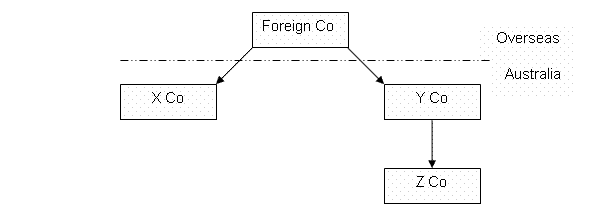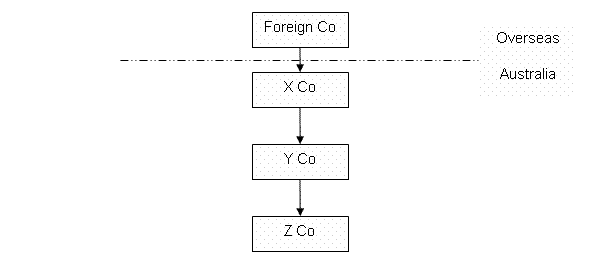Taxation Determination
TD 2006/27
Income tax: consolidation: capital gains: may roll-over relief under Subdivision 126-B of the Income Tax Assessment Act 1997 be available where two eligible tier-1 companies are restructured such that one of the eligible tier-1 companies becomes a wholly-owned subsidiary of the other eligible tier-1 company that immediately before the transfer had no wholly-owned subsidiaries?
-
Please note that the PDF version is the authorised version of this ruling.
FOI status:
may be released This Ruling provides you with the following level of protection:
This Ruling provides you with the following level of protection:
This publication (excluding appendixes) is a public ruling for the purposes of the Taxation Administration Act 1953. A public ruling is an expression of the Commissioner's opinion about the way in which a relevant provision applies, or would apply, to entities generally or to a class of entities in relation to a particular scheme or a class of schemes. If you rely on this ruling, we must apply the law to you in the way set out in the ruling (or in a way that is more favourable for you if we are satisfied that the ruling is incorrect and disadvantages you, and we are not prevented from doing so by a time limit imposed by the law). You will be protected from having to pay any underpaid tax, penalty or interest in respect of the matters covered by this ruling if it turns out that it does not correctly state how the relevant provision applies to you. |
Ruling
1. Yes, provided the requirements for roll-over relief under Subdivision 126-B of the Income Tax Assessment Act 1997 (ITAA 1997) are met.
2. Roll-over relief under Subdivision 126-B of the ITAA 1997 will be available if:
- •
- a CGT event (the trigger event) happens involving a company (the originating company) and another company (the recipient company) that are members of the same wholly-owned group at the time of the trigger event;
- •
- the CGT event is one of the events listed in subsection 126-45(2) of the ITAA 1997; and
- •
- the requirements set out in section 126-50 of the ITAA 1997 are satisfied.
Example 1
3. Foreign Co wholly owns two eligible tier-1 (ET-1) companies -X Co and Y Co. The income year for each company is 30 June. On 6 October 2003, Foreign Co transfers all of its shares in Y Co to X Co. Foreign Co and X Co choose roll-over relief under Subdivision 126-B of the ITAA 1997 in relation to the transfer of shares. X Co makes a choice under subsection 703-50 of the ITAA 1997 to form a consolidated group from 8 October 2003, consisting of Y Co and itself.
Group structure before transfer of shares

Group structure after transfer of shares

4. Under subsection 126-50(6) of the ITAA 1997, X Co is the Australian resident recipient company. At the time of the trigger event, it was not a member of a consolidated group or MEC group. Nor was it a member of a consolidatable group - t only became a member of a consolidatable group as a result of the transfer of shares. [1] Accordingly, Foreign Co and X Co are entitled to choose roll-over relief under Subdivision 126-B of the ITAA 1997 in relation to the transfer of shares in Y Co to X Co.
Example 2
5. Foreign Co wholly owns two eligible tier-1 (ET-1) companies - X Co and Y Co. Y Co has a wholly-owned subsidiary, Z Co. The income year for each company is 30 June. On 6 October 2003, Foreign Co transfers all of its shares in Y Co to X Co. Foreign Co and X Co choose roll-over relief under Subdivision 126-B of the ITAA 1997 in relation to the transfer of shares. X Co makes a choice under subsection 703-50 of the ITAA 1997 to form a consolidated group from 8 October 2003, consisting of Y Co, Z Co and itself.
Group structure before transfer of shares

Group structure after transfer of shares

6. Under subsection 126-50(6) of the ITAA 1997, X Co is the Australian resident recipient company. At the time of the trigger event, it was not a member of a consolidated group or MEC group. Nor was it a member of a consolidatable group - it only became a member of a consolidatable group as a result of the transfer of shares.[2] Accordingly, Foreign Co and X Co are entitled to choose roll-over relief under Subdivision 126-B of the ITAA 1997 in relation to the transfer of shares in Y Co to X Co.
Date of effect
7. This Determination applies to years commencing both before and after its date of issue. However, it does not apply to taxpayers to the extent that it conflicts with the terms of settlement of a dispute agreed to before the date of the Determination.
Commissioner of Taxation
12 April 2006
Appendix 1 - Explanation
 This Appendix is provided as information to help you understand how the Commissioner's view has been reached. It does not form part of the binding public ruling.
This Appendix is provided as information to help you understand how the Commissioner's view has been reached. It does not form part of the binding public ruling.
|
Explanation
8. The transfer of shares between companies will result in CGT event A1 in section 104-10 of the ITAA 1997 happening, which is one of the CGT events listed in subsection 126-45(2) of the ITAA 1997. The time CGT event A1 occurs (set out in subsection 104-10(3) of the ITAA 1997) is:
- •
- when you enter into the contract for the disposal; or
- •
- if there is no contract - when the change in ownership occurs.
9. If the originating company or recipient company is an Australian resident company at the time of the trigger event, subsection 126-50(6) of the ITAA 1997 requires this company to:
- •
- be a member of a consolidated group or MEC group at that time; or
- •
- not be a member of a consolidatable group at that time.
10. As part of a group restructure, where shares in a company are transferred from a foreign resident to an Australian resident recipient company without any wholly-owned subsidiaries, that company is not taken to be a member of a consolidatable group at the time of the trigger event. The recipient company only becomes a member of the consolidatable group as a result of the transfer of shares.[3]
11. Provided the other requirements in Subdivision 126-B of the ITAA 1997 are satisfied, the originating company and the recipient company may choose to obtain roll-over relief under Subdivision 126-B.
Footnotes
In determining whether an entity is a wholly-owned subsidiary of another entity for consolidation purposes, sections 703-30 and 703-33 of the ITAA 1997 apply.
See footnote 1 and section 703-10 of the ITAA 1997 which defines consolidatable group.
In determining whether an entity is a wholly-owned subsidiary of another entity for consolidation purposes, sections 703-30 and 703-33 of the ITAA 1997 apply.
Previously issued as TD 2005/D40
References
ATO references:
NO 2005/13296
Subject References:
consolidated groups
same asset roll-over
Legislative References:
TAA 1953
ITAA 1997 104-10
ITAA 1997 104-10(3)
ITAA 1997 Subdiv 126-B
ITAA 1997 126-45(2)
ITAA 1997 126-50
ITAA 1997 126-50(6)
ITAA 1997 703-10
ITAA 1997 703-30
ITAA 1997 703-33
ITAA 1997 703-50
